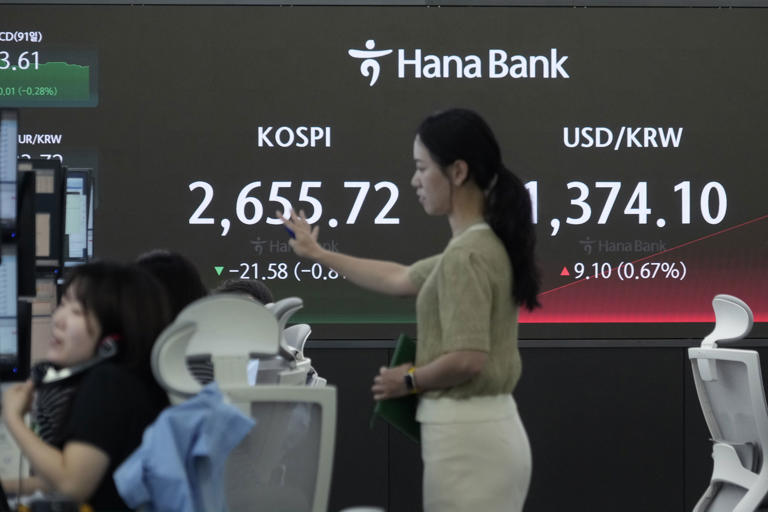European shares opened higher on Thursday, showing resilience in the face of a broad retreat in Asian markets where rising bond yields weighed heavily on stock prices. Germany’s DAX increased by 0.1% to 18,486.92, buoyed by strength in its major industrial and technology stocks. France’s CAC 40 climbed 0.3% to 7,956.50, supported by gains in luxury goods and financial services sectors. Meanwhile, the UK’s FTSE 100 rose by 0.3% to 8,204.61, benefiting from a lift in energy and mining stocks.
In contrast, U.S. stock futures indicated a potential decline at the opening bell, with S&P 500 futures down 0.4% and Dow Jones Industrial Average futures falling by 0.8%. This downward trend reflects investor caution amid rising bond yields and mixed economic signals.
The bond market has been a focal point for investors. By early Thursday, the 10-year Treasury yield had risen to 4.62% from 4.54% late Tuesday. This increase followed a significant auction of $44 billion in seven-year Treasurys. Rising yields generally lead to higher borrowing costs and can pressure stock prices as investors seek the relative safety and higher returns of government bonds.
In Asia, markets tracked a significant pullback on Wall Street. Tokyo’s Nikkei 225 benchmark dropped 1.3% to 38,054.13, its sharpest decline in recent weeks, driven by losses in technology and export-oriented companies. Hong Kong’s Hang Seng index declined by 1.3% to 18,230.19, weighed down by concerns over China’s economic outlook and regulatory pressures on the tech sector. The Shanghai Composite index gave up early gains to finish 0.6% lower at 3,091.68, with declines in financial and consumer stocks.
Other regional indices also experienced downturns. Australia’s S&P/ASX 200 slipped 0.5% to 7,628.20, influenced by weaker commodity prices and cautious trading. South Korea’s Kospi fell 1.6% to 2,635.44, with major losses in the semiconductor and automobile sectors. Taiwan’s Taiex decreased by 1.4%, affected by global tech sector sell-offs, and India’s Sensex was down 0.7%, pressured by declines in financial and energy stocks.
These moves in bond yields are part of a broader recalibration by traders regarding the Federal Reserve’s interest rate policy. Persistently high inflation has led to repeated delays in expectations for rate cuts, impacting investor sentiment and market dynamics. The Federal Reserve is attempting a delicate balancing act: it aims to use high interest rates to curb inflation without causing a severe economic slowdown or widespread layoffs.
The S&P 500 index, a broad measure of U.S. stock performance, dipped 0.7% on Wednesday, trimming its gains for May, which had been on track to be its best month since November. Approximately 80% of the stocks in the index fell. The Dow Jones Industrial Average lost 1.1%, while the tech-heavy Nasdaq composite slipped 0.6%. Despite these declines, certain sectors, particularly those linked to artificial intelligence technology, have continued to perform strongly. For instance, Nvidia’s robust profit report has driven further interest in AI-related stocks, with its shares rising 0.8% on Thursday, marking a more modest gain after a series of sharp increases.
In other market dealings early Thursday, U.S. benchmark crude oil saw a minor increase, adding 1 cent to $79.22 per barrel in electronic trading on the New York Mercantile Exchange. However, Brent crude, the international standard, declined by 5 cents to $83.38 per barrel, reflecting ongoing concerns about global demand and supply dynamics.
In the currency market, the U.S. dollar showed mixed performance. It slipped to 156.93 Japanese yen from 157.65 yen, indicating a slight weakening against the Japanese currency. The euro, on the other hand, rose to $1.0818 from $1.0803, reflecting a modest gain as traders assessed economic conditions in the Eurozone and the implications of future interest rate moves by the European Central Bank.
Overall, the global financial markets are navigating a complex landscape marked by rising bond yields, inflation concerns, and recalibrations of central bank policies. Investors are closely monitoring these developments, balancing their portfolios between the relative safety of bonds and the growth potential of equities, particularly in emerging sectors like artificial intelligence.
